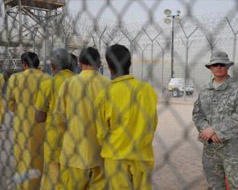
US Military Closes Huge Prison in Southern Iraq
Hannah Allam - McClatchy Newspapers
Baghdad - The US military on Wednesday announced the closing of the sprawling Camp Bucca prison in southern Iraq, transferring $50 million in infrastructure and custody of all but 180 of the site's detainees to the Iraqi government.

Iraqi detainees being transfered out of Camp Bucca in southern Iraq. (Photo: Spc. Tyler Lasure / dvids
Early this year, the US military began emptying the prison, releasing 5,600 detainees and transferring another 1,400 with arrest warrants or detention orders to Iraqi authorities, according to the U.S. military's Task Force 134, which oversees American-run prisons in Iraq.
Once the remaining 180 prisoners, considered dangerous "high-risk detainees," are moved to U.S.-run detention centers in and around Baghdad, Bucca officially will be closed. The transfer was expected late Wednesday or early Thursday.
As of September, the U.S. military still held a total of 8,485 prisoners in Iraq, down from 15,500 in January, according to the military.
Brig. Gen. David E. Quantock, commander of U.S. detainee operations, told Iraqi journalists visiting Bucca on Wednesday that the military is leaving behind the prison infrastructure, including an ice factory, a brick factory and a water-purifying unit. Quantock said one part of the former prison would be used by the Iraqi Navy and another would be used to train corrections officers through the Iraqi Ministry of Justice.
Camp Bucca stands at the southernmost tip of Iraq, so close to neighboring Kuwait that some prison workers used to dash across the border for fast food runs. Named after a New York firefighter who died in the Sept. 11 attacks, Bucca began as a far-flung tent city surrounded by razor wire and a vast desert.
It grew into the military's largest prison in the world, and commanders used it as a closely monitored laboratory for studies in long-term detention. The results changed U.S. military doctrine on enemy prisoners of war, leading to new manuals on interrogation and detention practices, commanders told McClatchy in previous interviews.
As Iraqi officials point out, however, the changes at Bucca came only after the Abu Ghraib prisoner abuse scandal exploded into the news, undercutting the U.S. military's perceived moral superiority and fueling support for insurgents. For many Iraqis, U.S.-run prisons remain synonymous with torture, sexual assault, and indefinite detention without formal charges - though Iraqi-run prisons are now accused of similar violations.
"Bucca has been a shameful stain on Iraq since the regime change," said Shatha al Obousi, a Sunni Muslim lawmaker who serves on the Iraqi parliament's human rights committee. "The problems Iraqi prisoners had with the Americans weren't related to hunger or mistreatment, but it was the long delays in their cases, the lack of investigations and lack of charges. Prisoners didn't know the status of their cases and they remained there for years."
Former detainees interviewed by McClatchy described a hostile American guard force and an even more terrifying population of hardened jihadist detainees who operated their own parallel "prison command," which was known for stuffing rocks into socks and beating prisoners who didn't pledge allegiance to them.
Muhannad Saadoun al Jumeili, a 34-year-old teacher and father of five, said he was arrested by Iraqi forces in 2006 after an informant told them he had illegal weapons. Jumeili, a Sunni from the restive western Anbar province, said he was transferred to U.S. custody and languished in Camp Bucca for two nearly years before he was released without charge in November 2008. (Detention officials couldn't be reached to confirm the dates and circumstances of his detention.)
Jumeili said he witnessed several harrowing incidents at Bucca and eventually demanded U.S. protection from Islamist extremists who targeted him because he defended an elderly detainee who was a Sufi, following a branch of Islam they considered heretical.
Jumeili said he was so scared after receiving death threats from fellow detainees that he and a friend stood right under the U.S. guard tower, refusing to move or eat until corrections officers moved them to a safer camp in the prison.
"I hope to God that housing projects are built on the sites of Bucca, Abu Ghraib and Cropper, so that when we see them, we don't recall the painful memories of those days," Jumeili said, referring to other prisons the U.S. military operated in Iraq.
--------
(McClatchy special correspondents Jamal Naji in Fallujah and Ali al Basri in Basra contributed.)
